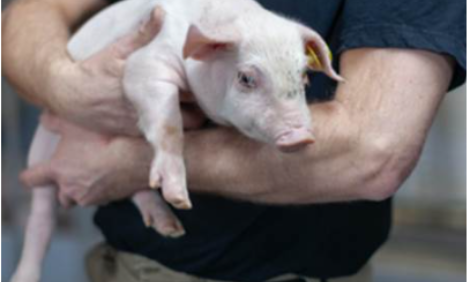



Gene editing + vaccines could eradicate some pig diseases in 3-6 years
Could this end PRRS in commercial operations?Combining gene technologies with vaccination could eliminate certain livestock diseases in less than six years, a modelling study suggests.
Some livestock diseases could potentially be eradicated by introducing a proportion of animals that are genetically resistant to disease due to gene editing into some vaccinated herds, research led by the Roslin Institute suggests.
Gene-edited pigs resistant to disease would be introduced into breeding programmes and over generations pigs would become genetically resistant to disease.
Eliminating disease on a national scale would be difficult to achieve using gene editing or vaccination alone, but it would be possible by combining the two approaches, computational models predict.
Having 10% of genetically resistant animals in a fraction of herds may eradicate disease in three to six years, the findings indicate.
The number of genetically resistant animals that would be required to manage and eliminate disease depends strongly on rates of virus transmission, vaccine efficiency and the distribution of genetically resistant animals across herds, the findings suggest.
Findings from the study, which focused on Porcine Reproductive and Respiratory Syndrome (PRRS), could help eradicate this deadly disease, which costs the pig industry more than £1.75 billion per year in the US and Europe alone.
"Conventional measures have failed to control PRRS, a devastating disease in pigs. Our models predict that gene editing combined with vaccination could drastically reduce the number of infected animals and could potentially even eliminate PRRS in a few years of selective breeding. However, some caution is advised when interpreting the model results, as many factors that contribute to disease elimination in practice, such as natural genetic variation in disease resistance or economic aspects, have not been considered in this proof-of-concept study," Professor Andrea Wilson, The Roslin Institute.
Gene-edited pigs that are resistant to PRRS have been produced at the Roslin Institute and are the subject of ongoing collaborative research.
Testing scenarios
Researchers aimed to assess whether gene editing could potentially eradicate or reduce prevalence of a disease that so far has defied control using conventional methods.
They developed a model to simulate the effects of genetic resistance, vaccination and a combination of both in controlling PRRS at national level.
Pigs sold for food would not be gene edited, but would be genetically resistant due to selective breeding of gene-edited pigs. To determine the time required to produce enough genetically resistant pigs for disease elimination, the researchers applied a second model to simulate the spread of resistance genes introduced into breeding programmes.
A range of scenarios were tested that considered different virus transmission rates, vaccine efficiencies and distribution of genetically resistant animals across herds.
PRRS elimination could be achieved in less than three years when resistant animals are distributed optimally throughout herds given a vaccine that is at least 70 per cent effective. In other scenarios this could take up to six years.
In the most realistic scenario without vaccination, the majority of animals in the population would have to be genetically resistant to PRRS for the disease to be eliminated.
The study was a collaboration between the Roslin Institute and agribusiness consultants AbacusBio.
It is published in Proceedings of the National Academy of Sciences (PNAS) and was funded through the UK Research and Innovation’s Industry Strategic Challenge Fund (ISCF) Transforming Food Production Seeding Award.
To read the full study, go here.









